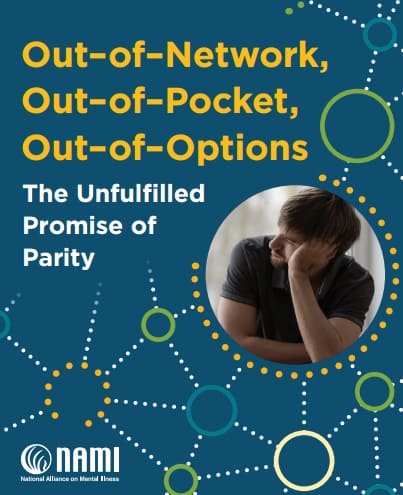November 22, 2016
By Dania Douglas

Imagine parents who make call after call, only to discover the soonest a nearby therapist can see their child is in three months. Imagine a young professional who can barely afford the out-of-network psychiatrist she is seeing, so she cuts back on appointments, putting her stability at risk. Imagine a family who cannot find a residential eating disorders treatment program within their insurance network, so they incur mountains of debt to send their daughter to an out-of-network facility.
These scenarios may sound far-fetched, yet for many Americans living with mental health conditions, they are reality.
“[My relative] has had terrible trouble finding a psychiatrist in our community. He has been traveling 50 miles each way to see a psychiatrist. The wait lists for all psychiatrists locally are between 6 months and two years.” [Survey Respondent]
Last week, NAMI released a new report, Out-of-Network, Out-of-Pocket, Out-of-Options, The Unfulfilled Promise of Mental Health Parity, that describes the barriers millions of Americans face in finding and paying for quality mental health care. Based on an survey of more than 3,000 people living with mental illness and their family members, the report found that people had far more difficulty finding mental health providers in their health insurance network compared to other types of medical providers. This means that people often faced longer wait times and relied on more expensive, out-of-network care for their mental health needs.
People with mental health conditions have faced persistent discrimination in insurance coverage; for many years, people with mental health conditions were often denied coverage entirely and those who did have insurance faced unfair limitations on the amount and type of care they could receive. Despite recent progress—including new legal requirements for fairness under the Mental Health Parity and Addiction Equity Act and the Patient Protection and Affordable Care Act—significant challenges remain.
“The majority of the mental health professionals in my area do not participate in any insurance plan . . . We have depleted our savings and incurred much debt to get the quality mental health care we need.” [Survey Respondent]
NAMI’s report recommends that health plans:
What You Can Do
Considering filling out this year’s survey about your experiences with health coverage. The survey makes it possible for NAMI to identify where there has been progress and where we need to advocate more strongly. And your stories help us, as well.
*Survey closed* Filling out the survey will take about 20 minutes. And make sure you share it with your family and friends. The survey closes on Wednesday, December 31st, 2016 at Midnight EST.
NAMI envisions a future in which the promises of parity are truly fulfilled. People with mental health conditions and their families deserve access to timely, affordable and quality mental health care. Until effective treatment, services and supports are available to people living with mental health conditions, NAMI will remain a leading voice in the fight for parity.
We’re always accepting submissions to the NAMI Blog! We feature the latest research, stories of recovery, ways to end stigma and strategies for living well with mental illness. Most importantly: We feature your voices.
LEARN MORENAMI HelpLine is available M-F, 10 a.m. – 10 p.m. ET. Call 800-950-6264,
text “helpline” to 62640, or chat online. In a crisis, call or text 988 (24/7).